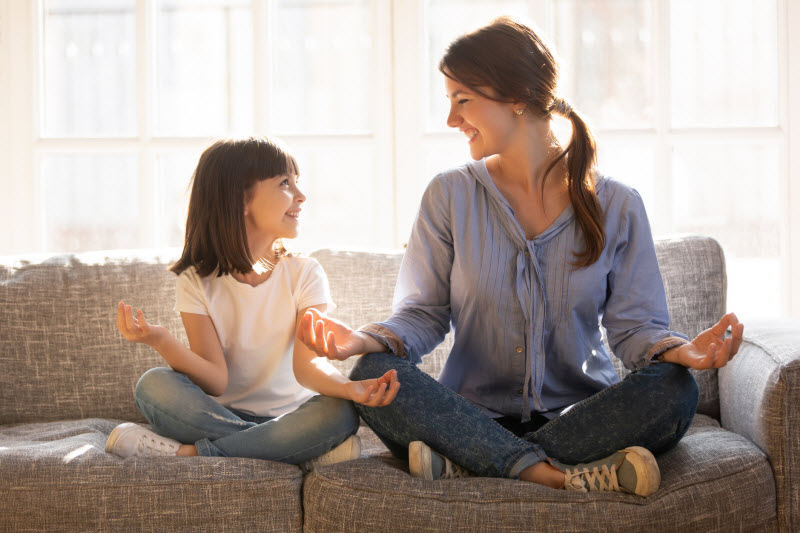Kids cope with stress under normal circumstances — the stress of school, extracurricular activities and so many other aspects of their lives. But the abnormal conditions of the
coronavirus pandemic have weighed down children with far more stress. Simply put, the pandemic has upended their lives.
“The most important thing to consider is that stress can directly and indirectly affect all parts of a person’s
physical and mental health. Too much stress makes everything worse,” licensed professional counselor
Eric Patterson says.

It’s far from a hopeless situation, though. To combat the effects of stress on kids, parents should follow these seven tips.
1. Communicate with your kids.
Holistic physician
Dr. Bradley Nelson says an important piece of information to share with your kids is that the pandemic won’t last forever.
“Knowing that this is all a temporary situation can go a long way toward alleviating children’s natural fears and anxieties,” says Nelson, author of “The Emotion Code.”
Loren Lomme, a licensed professional counselor and registered play therapist, says it’s also critical for you to frequently ask your kids what’s on their minds and let them express their thoughts.
“There are no right or wrong answers here, and parents can provide some powerful stress relief by just listening and validating their kids’ thoughts and emotions,” she says. “This is also a great opportunity to listen for misperceptions that your child may have that could be exacerbating fears.”
Board-certified psychiatrist
Dr. Carole Lieberman suggests validating your kids’ feelings with comments like this: “I understand how you’re feeling. Let’s talk about what’s going on in the world that’s making you feel this way, and you can ask me anything you want.”
2. Try to stay upbeat.
Children take their cues from the attitudes and emotions of their parents, other adults and older children, Nelson notes. Therefore, he says, it’s vital to maintain a positive mental state and not let your own negative emotions get the best of you.
In the same vein, licensed professional counselor
Monica Douglas Davis says you should be patient with yourself and your kids.
“This is uncharted territory for us all. There is no manual to follow. Mistakes will happen,” Davis says. “Be kind, truthful and forgiving, and move on.”
3. Create a routine.
Lomme says kids function best when they know what to expect. That’s why she recommends establishing a day-to-day routine.
“During a time when so much of their world may feel chaotic, having a schedule or daily routine will add a sense of security and predictability,” she says.
If possible, seek your child’s input when you’re setting up a schedule, Lomme suggests. Are there certain activities they’d like to happen at specific times of the day? Are there daily activities that you as a parent know are important for your kids?
4. Prioritize sleep.
Lomme says that ensuring your kids get a proper amount of sleep helps keep their emotions in check. As part of good sleep habits, adhere to a
bedtime routine, stick to a consistent bedtime and cut back on screen time late in the evening, she says.
“Because our nervous system is responsible for regulating our moods and transmitting all kinds of information that helps us during daily functioning, it’s imperative that it gets a chance to relax during sleep,” Lomme says.
According to the American Academy of Pediatrics, here’s the recommended daily amount of sleep for kids:
- 4 to 12 months — 12 to 16 hours, including naps
- 1 to 2 years old — 11 to 14 hours, including naps
- 3 to 5 years old — 10 to 13 hours, including naps
- 6 to 12 years old — Nine to 12 hours
- 13 to 18 years old — Eight to 10 hours
5. Plan playtime.
Especially if they’re being homeschooled, your kids should be given some downtime, such as virtual playdates with their friends, Lomme says. This activity could, for instance, be spread across 10-minute spurts during the day or built into a 30-minute swath of time.
6. Get moving.
Research shows
exercise can ease stress. Exercise is especially critical at a time when many kids are moving less than they normally would. The types of physical activity appropriate for your child depend on their age. Here are some overall suggestions,
courtesy of UT Health San Antonio:
- Online fitness classes
- Organized playtime
- Nature hikes
- Neighborhood walks
- Cycling
- Swimming
- Gymnastics
- Dancing
- Gardening
- Soccer
- Basketball
7. Practice self-care.
Licensed clinical social worker
Ned Presnall points out that parents must set aside time to meet their own needs in order to adequately meet their children’s needs.
“This can mean an introverted parent negotiating with his partner to have some alone time or a parent who enjoys exercising getting up before dawn to go for a run,” Presnall says. “Some parents may feel guilty for
spending extra time on themselves, but the investment is overwhelmingly worth it.”
Featured Products:


 It’s far from a hopeless situation, though. To combat the effects of stress on kids, parents should follow these seven tips.
It’s far from a hopeless situation, though. To combat the effects of stress on kids, parents should follow these seven tips.






